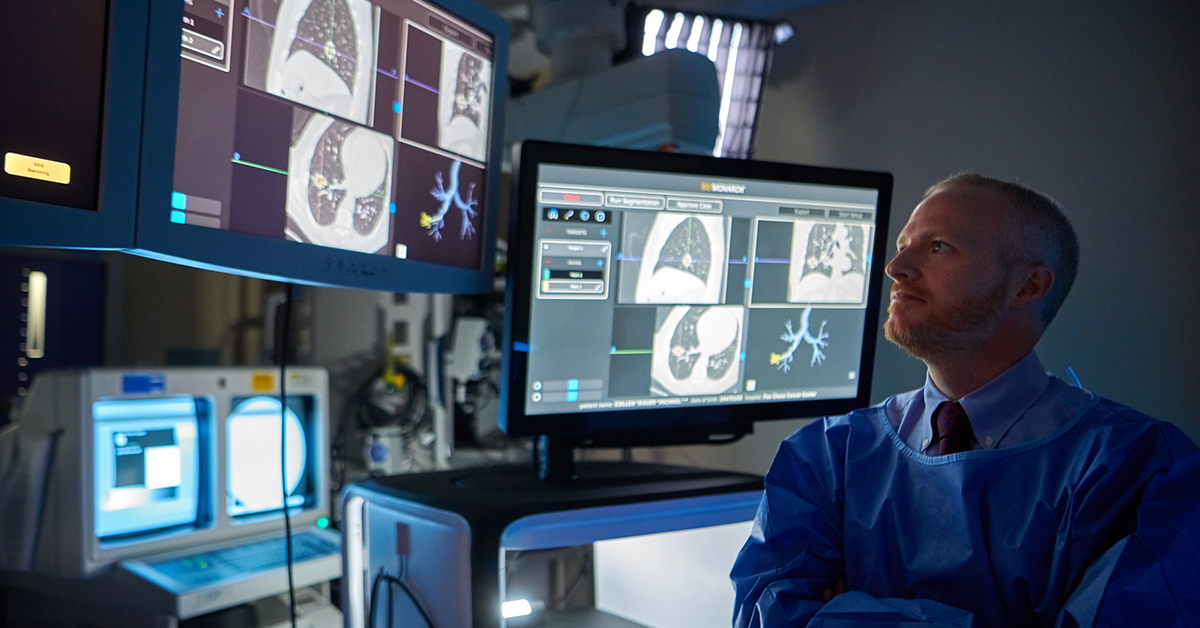
You Have a Lung Nodule—Now What?
-
Finding out that you have a lung nodule can be scary. Many people think ‘cancer’ right away even though nodules can be caused by a variety of things that aren’t cancer.
Alan Haber, MD, FCCP, Chief of the Section of Pulmonary, and Christopher Manley, MD, Director of Interventional Pulmonolgy at Fox Chase Cancer Center, both weighed in on what patients should do if they have a lung nodule.
How are lung nodules discovered?
“Some patients find out they have lung nodules during cancer screening, but nodules are more commonly found incidentally when a CT scan or a chest x-ray is done for another reason. It is often completely unexpected,” Manley said.
What are patients advised to do if they have lung nodules?
Patients being screened for cancer will be told what specific follow-up steps need to be taken. At Fox Chase, that all happens on site. But, Haber said, patients who went to an emergency room or hospital and got a CT scan for unrelated reasons may receive a call they have a lung nodule, and they may not know what to do next.
“Some patients will go to their primary care provider, but it is difficult to know right away which nodules are cancerous and which are not. This is why it makes sense to be evaluated at a comprehensive care center like Fox Chase where we see lung nodules often,” Manley said.
“We discuss each patient case with a multifunctional tumor board, which is like getting multiple second opinions at the same time. Most patients want a specialist to help them determine what the best course of action is,” he added.
How are patients with lung nodules evaluated at Fox Chase?
Fox Chase makes every effort to get next-business-day appointments for patients who call in. Each patient will be assigned a multidisciplinary care team that may include a medical oncologist, pulmonologist, thoracic surgeon, nursing staff and pathologists.
A CT scan is typically done first, with other testing, biopsy, or surgery as needed.
“In most instances we need a biopsy to confirm a diagnosis. We also want to know if the nodule has grown since the first CT scan. If it is cancerous, tumor type and genetics are evaluated to tailor therapy to the patient,” Manley said.
Are patients who have a history of cancer evaluated differently?
“We need to evaluate if the lung cancer is a new manifestation or a consequence of another cancer. We look at the patient with new eyes and take a fresh approach, because the treatment will be very different for lung cancer than it is for cancers that spread to the lung from other areas,” Haber added.
What if you need a biopsy?
Highly specialized physicians at Fox Chase now do robotic bronchoscopy, which can enable earlier and more accurate diagnosis of lung nodules, particularly if they are small or in hard-to-reach areas. A hand-held controller is used to direct a small, flexible endoscope into the lung using computer-assisted navigation.
Physicians view the lung continuously throughout the procedure, and the views are based on 3-D models of the patient’s own lung anatomy. Tiny tissue samples are taken from the nodes. The lymph nodes are also viewed. The entire process typically takes about 4-6 hours, with the bronchoscopy itself lasting less than an hour.
Biopsy results are usually ready in 3-5 days, during which time pathologists prepare and examine the tissue carefully to arrive at a firm diagnosis.
Why should patients with lung nodules consider coming to Fox Chase?
Every patient is a priority at Fox Chase. Multidisciplinary teams are poised to care for each patient, beginning with a thorough evaluation that leads to a diagnosis and a follow-up plan that the patient and care team can have confidence in.
“There is a tremendous upside to coming to a comprehensive cancer center,” Haber said. “We are focused on providing the best diagnostic and therapeutic options for patients.”
Learn more about how lung nodules are managed at Fox Chase Cancer Center
